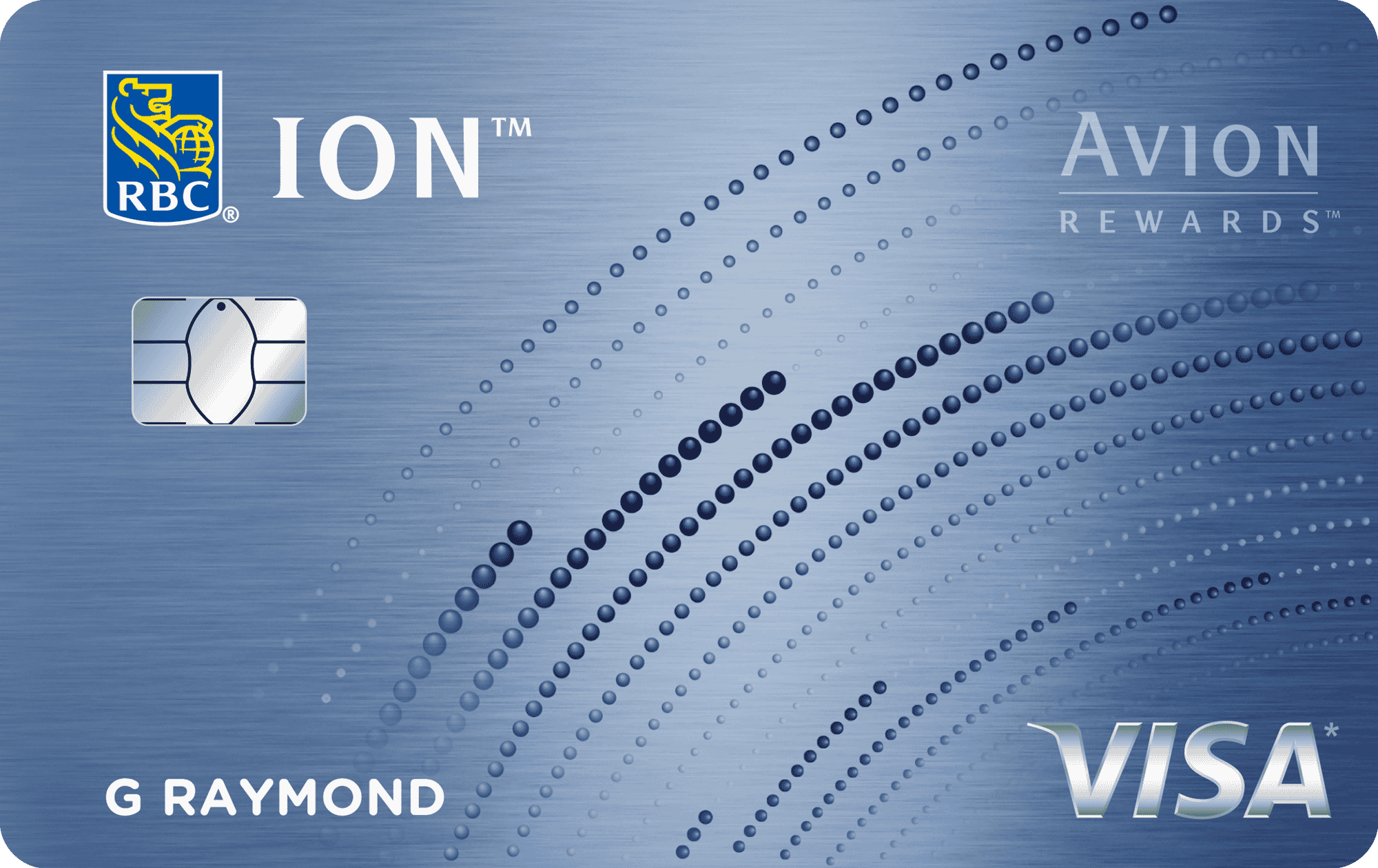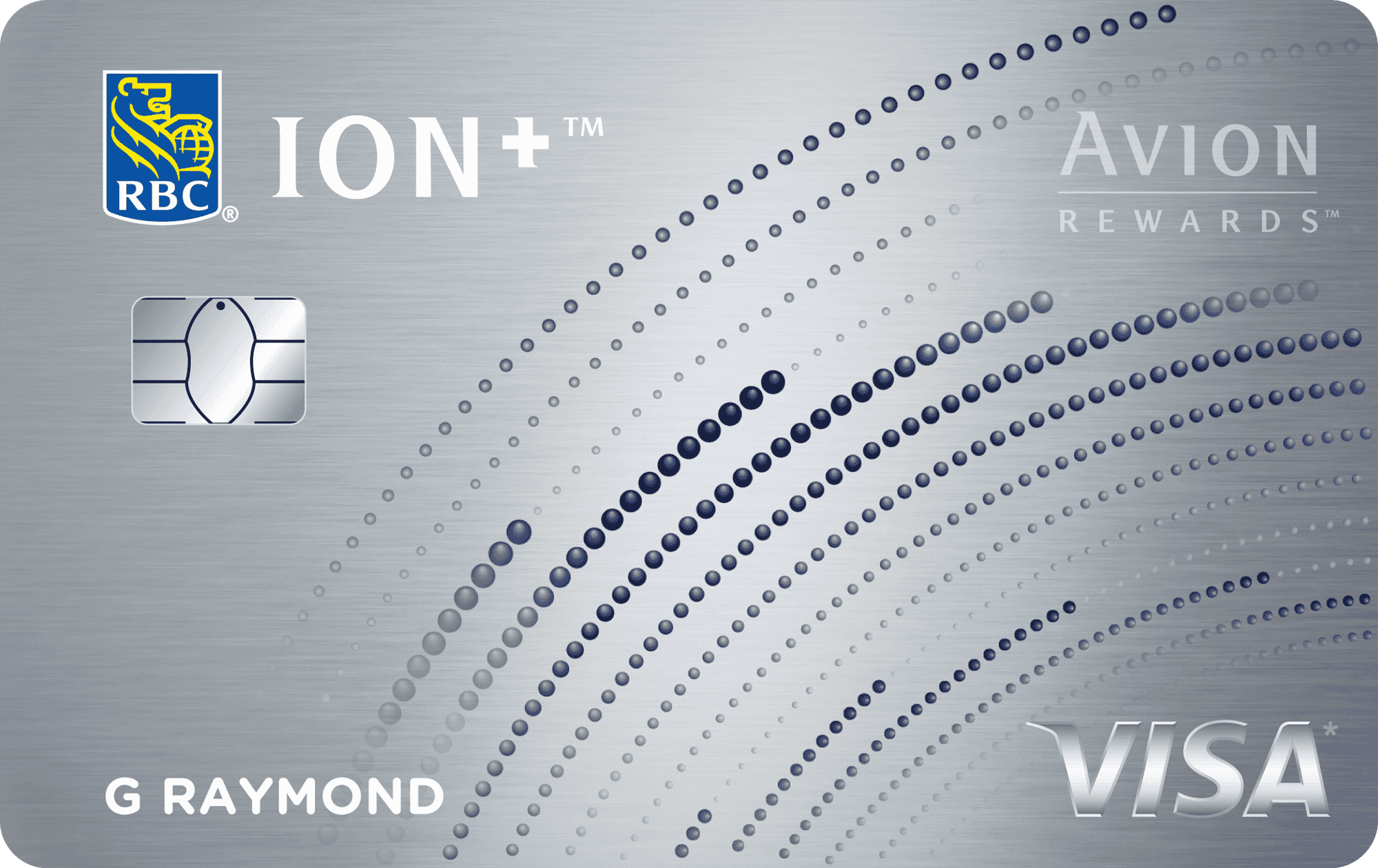RBC is launching two brand-new credit cards: the RBC Ion and RBC Ion+ Visa cards, as replacements for the RBC Rewards+ Visa and Signature RBC Reward Visa, respectively.
Let’s go through the new offerings and take a look at how these two refreshed entry-level cards could make its way into your wallet.
RBC Ion Visa
The RBC Ion Visa is RBC’s new product, where the Rewards+ Visa used to be, and earns the new Avion Rewards points.
Note that while these have the same name as the more premium RBC Avion Visa Infinite and RBC Avion Visa Infinite Privilege cards, this earns Avion Premium rather than Avion Elite points (more details below on the implications).
The RBC Ion Visa has no annual fee. As a welcome bonus for new cardmembers, you can earn 6,000 Avion points upon approval provided you apply before November 30, 2022.
On everyday spending, you’ll earn rewards as follows:
-
1.5 Avion points for every $1 spent on groceries, gas, rideshare, daily public transit, electric vehicle charging, streaming, digital gaming, and digital subscriptions
-
1 Avion point for every $1 spent on all other purchases
This no-fee credit card is clearly targeted for casual travellers who spend a fair amount on rideshares, transit, streaming, and video games.
It’s the only card to target spending in these categories, and will likely appeal to younger millennials and Gen Z who wish to earn flexible travel rewards.
6,000 points is an excellent bonus on a no-annual fee credit card and can be redeemed through the Avion Rewards portal.
This also brings the welcome bonus more in line to other entry-level in-house-rewards-earning cards, such as the CIBC Aventura Visa Card and the TD Rewards Visa Card, with slight variations on which merchant categories earn at bonus rates.
Insurance offerings are basic, which is fully expected on entry-level cards such as this RBC Ion Visa.
- Earn 7,000 Avion points upon approval†(worth up to $50 in gift cards†)
- Earn 3,125 Moi Rewards points upon linking to your Moi card†(worth up to $25 in groceries†)
- Earn 1.5x Avion points† on qualifying grocery, gas, rideshare, daily public transit, electric vehicle charging, streaming, digital gaming and digital subscriptions†
- Annual fee: $0
RBC Ion+ Visa
The RBC Ion+ Visa is RBC’s new product to replace the old Signature RBC Visa Card, and also earns the new Avion Rewards points.
The RBC Ion+ Visa has a new monthly fee of $4, and the signup bonus is 12,000 Avion points upon approval if you apply prior to November 30, 2022.
You’ll earn the following rewards on everyday spending:
-
3 Avion points for every $1 spent on grocery, dining, food delivery, gas, daily transit, rideshares, streaming, digital gaming and digital subscriptions
-
1 Avion point for every $1 spent on all other purchases
The elevated earnings categories are near identical to the lower-tier RBC Ion Visa, but the Ion+ comes with a monthly $4 cost to offset that. Moreover, the additional elevated earnings categories on the Ion+ also encompass dining and food delivery.
Monthly fees rather than annual fees are a trend we’re seeing across the greater credit card landscape across Canada, and the reasons are obvious: it appears lower at first glance, and it’s easy to understand for the younger generation who are very familiar with monthly subscription models.
Between the RBC Ion Visa and the RBC Ion+ Visa, you’ll want to pick the Ion+ if you spend at least $134 a month on groceries, dining, food delivery, gas, transportation, streaming, digital gaming, and digital subscriptions, since that’s the breakeven point on the $4 monthly fee.
The 12,000 Avion point welcome bonus is also easily earned by simply being approved for the card, and can be redeemed using the Avion Rewards portal.
For the small monthly fee, there is also a basic set of insurance coverage, including mobile device insurance, purchase security, and extended warranty.
- Earn 14,000 Avion points upon approval†(worth up to $100 in gift cards†)
- Earn 3,125 Moi Rewards points upon linking to your Moi card†(worth up to $25 in groceries†)
- Earn 3x points† on qualifying grocery, dining, food delivery, gas, rideshare, daily public transit, electric vehicle charging, streaming, digital gaming and digital subscriptions†
- Earn 1 extra Moi Rewards point for every two dollars spent at Metro, Food Basics, Super C, Jean Coutu, Brunet and Première Moisson when you scan your Moi card and pay with your linked RBC Card (minimum purchase required).¹¹
- Mobile device insurance†
- Annual fee: $48 ($4 charged monthly)†
How to Use Avion Points from the RBC Ion Cards
Although the RBC Ion and Ion+ Visas earns the same Avion points as the higher-tier RBC credit cards, these points can’t be transferred to RBC’s airline partners (technically, Ion and Ion+ earn Avion Premium while the Avion Visa Infinite and Avion Visa Infinite Privilege earn Avion Elite points).
The exception is WestJet Rewards, where Ion-earned Avion points can be transferred at a 1:1 ratio (1 Avion point = $0.01 in WestJet Dollars).
Also, Ion cardholders can’t redeem points via the Air Travel Redemption Schedule, which lets you use Avion points to book round-trip economy class tickets departing from Canada, up to a certain maximum ticket price.
Instead, you’re limited to using your points at a flat rate of 0.58 cents per point (cpp) for travel booked via the Avion Rewards centre, which is a lot weaker than the 1cpp redemption rate that you get from holding a higher-tier Avion card.
Luckily, if you also hold, say, an RBC Avion Visa Infinite, you can transfer Avion points at a 1:1 ratio between your different Avion cards, so the weaker points you earn from the Ion cards can still be converted into more powerful Avion cards too.
What’s more, if you ever decide to upgrade your Ion card to one of the RBC Avion cards, any points you’ve collected will be upgraded as well. Then, you’ll have the ability to access higher-value travel redemptions that are exclusive to Avion cardholders: frequent flyer partners, the Air Travel Redemption Schedule, and the ability to redeem points directly against travel at 1cpp.
Your points never expire for as long as you’re a cardholder. If you cancel or switch to a different RBC product, you have 90 days to redeem your points before they go away.
The RBC Credit Card Portfolio
Long-term, as cards with no or low annual fees, the RBC Ion and Ion+ Visa cards would be good downgrade options if you are thinking about cancelling your RBC Avion Visa Infinite or RBC Avion Visa Infinite Privilege but want to keep your points alive or preserve an old credit account.
However, either of the higher-tier cards would be the optimal choice for a new signup if you qualify for them, with larger welcome bonuses and travel insurance benefits.
After that, you can reevaluate the value proposition in the second year, and consider switching to either of the Ion products depending on your monthly spending on groceries, gas, daily transit, rideshare, streaming, digital gaming, and digital subscriptions.
Conclusion
The RBC Ion Visa and RBC Ion+ Visa cards are welcome new products to replace the previous RBC Rewards+ Visa and Signature RBC Rewards Visa cards, which had begun to grow a bit stale.
These two new cards are innovative and refreshing, shown in major changes to their elevated category earnings, new monthly fee structure on the Ion+, and ever so slight changes to their travel insurance policies.
The target audience is undeniably mass market, skewing towards millennials, Gen Z, and other younger persons who tend to spend on streaming, digital gaming, and digital subscriptions.
In this way, the Ion and Ion+ not only fills a useful supporting role to greater RBC Avion portfolio, but also stand out on their own as unique product offerings to hold long-term.
The welcome bonus offerings are solid across the board, and you can upgrade both the new cards to a more premium Avion Rewards card anytime you wish to take advantage of RBC Avion’s excellent transfer partners.
Refer to RBC page for up to date offer terms and conditions.















I have an RBC Avion Infinite business credit card. This new Ion+ card seems extremely attractive if you can transfer Avion points from the Ion to the Avion card. 3 points per $ spent on groceries/dining, then transferring them to the Avion card means you could essentially earn up to 6% back in travel redemption… Or am I missing something?